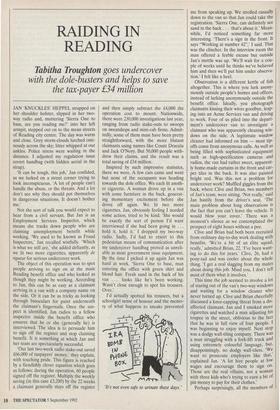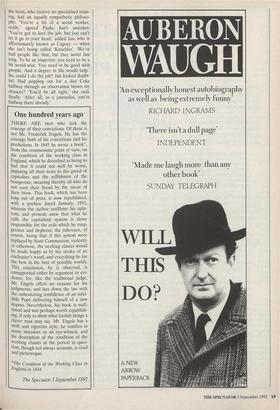RAIDING IN READING
Tabitha Troughton goes undercover
with the dole-busters and helps to save the tax-payer £34 million
JAN 'KNUCKLES' HEPPEL strapped on her shoulder holster, slipped in her two- way radio and, muttering 'Sierra One to base, are you reading me?' into her left armpit, stepped out on to the mean streets of Reading city centre. The day was warm and close. Grey storm-clouds lurched omi- nously across the sky; litter whipped at our ankles. Police sirens were wailing in the distance. I adjusted my regulation issue covert handbag (with hidden aerial in the strap).
`It can be tough, this job,' Jan confided, as we lurked on a street corner trying to look inconspicuous. 'A lot of people can't handle the abuse, or the threats. And a lot don't see why they should put themselves in dangerous situations. It doesn't bother me.'
Not the sort of talk you would expect to hear from a civil servant. But Jan is an Employment Services Inspector, which means she tracks down people who are claiming unemployment benefit while working. 'We used to be known as Fraud Inspectors,' Jan recalled wistfully. 'Which is what we still are,' she added defiantly, as we lit two more cigarettes, apparently de rigueur for serious undercover work.
The object of this operation was to spot people arriving to sign on at the main Reading benefit office and who looked as though they might be working. According to Jan, this can be as easy as a claimant arriving in a van with a company name on the side. Or it can be as tricky as looking through binoculars for paint underneath the claimant's fingernails. Once the sus- pect is identified, Jan radios to a fellow inspector inside the benefit office who ensures that he or she (generally he) is interviewed. The idea is to persuade him to sign off the register and stop claiming benefit. It is something at which Jan and her team are spectacularly successful.
`Our last two-week radio stake-out saved £66,000 of taxpayers' money,' they explain, with touching pride. This figure is reached by a fiendishly clever equation which goes as follows: during the operation, 60 people signed off the register. Multiply the weekly saving (in this case £3,200) by the 22 weeks a claimant generally stays off the register and then simply subtract the £4,000 the operation cost to mount. Nationwide, there were 230,000 investigations last year, ranging from radio stake-outs to swoops on sweatshops and mini-cab firms. Admit- tedly, some of them must have been pretty straightforward, with the more blatant claimants using names like Count Dracula and Jack O'Nory. But 50,000 people with- drew their claims, and the result was a total saving of £34 million.
Inspired by such impressive statistics, there we were. A few cars came and went but none of the occupants was heading towards the dole office. We each lit anoth- er cigarette. A woman drove up in a van with some furniture in the back, generat- ing momentary excitement before she drove off again. We lit two more cigarettes. Jan, obviously feeling I needed some action, tried to be kind. 'She would be exactly the sort of person I'd want interviewed if she had been going in . . . hold it, hold it.' I dropped my two-way radio. Sadly, I'd had to resort to this pedestrian means of communication after my undercover handbag proved as unreli- able as most government issue equipment. By the time I picked it up again Jan was hard at work. 'Sierra One to base, man entering the office with green shirt and blond hair. Fresh sand in the back of his van . . . looks like he's been working. Wasn't close enough to spot his trousers. Over.'
I'd actually spotted his trousers, but a schoolgirl sense of honour and the memo- ry of what happens to sneaks prevented `It's not even safe to urinate these days.' me from speaking up. We strolled casually down to the van so that Jan could take the registration. 'Sierra One, can definitely see sand in the back . . . that's about it.' Mean- while, I'd noticed something far more interesting. 'There's a sign in the front. It says "Working at number 42",' I said. That was the clincher. In the interview room the man offered a feeble excuse but outside Jan's mettle was up. 'We'll wait for a cou- ple of weeks until he thinks we've believed him and then we'll put him under observa- tion.' I felt like a heel.
Observation is a different kettle of fish altogether. This is where you lurk anony- mously outside people's homes and offices, instead of lurking anonymously outside the benefit office. Ideally, you photograph claimants kissing their wives goodbye, leap- ing into an Acme Services van and driving to work. Four of us piled into the depart- ment's undercover van to investigate a claimant who was apparently cleaning win- dows on the side. A legitimate window cleaner had informed on him — most tip- offs come from anonymous calls. As well as being filled with sophisticated equipment such as high-specification cameras and radios, the van had rather sweet, apparent- ly home-made curtains in the front and car- pet tiles in the back. It was also painted bright red. Was this not a problem for undercover work? Muffled giggles from the back, where Clive and Brian, two members of Jan's team, were sitting. 'Not really,' said Jan hastily from the driver's seat. 'The main problem about long observations is the fact that you can't leave the vehicle. It would blow your cover.' There was a moment's silence as we contemplated the prospect of eight hours without a pee.
Clive and Brian had both been recruited from ordinary day-to-day work dealing with benefits. 'We're a bit of an elite squad, really,' admitted Brian, 22. 'I've been want- ing to do this for years.' Clive, 26, had a pony-tail and was cooler about the whole thing. 'I get a real slagging from my mates about doing this job. Mind you, I don't tell most of them what it involves.'
This time the job seemed to involve a lot of staring out of the van's two-way windows and waiting for a window cleaner who never turned up. Clive and Brian cheerfully discussed a knee-capping threat from a dis- affected claimant. Jan and I smoked more cigarettes and watched a man adjusting his toupee in the street, oblivious to the fact that he was in full view of four people. I was beginning to enjoy myself. Next stop was a dodgy wall-tiling company. There was a man struggling with a fork-lift truck and using extremely colourful language, but, disappointingly, no dodgy wall-tilers. 'We want to prosecute employers like that,, explained Jan. 'A lot hire people at low wages and encourage them to sign on. Those are the real villains, not a woman with three kids who's trying to earn a bit of pin money to pay for their clothes.'
Perhaps surprisingly, all the members of the team, who receive no specialised train- ing, had an equally sympathetic philoso- phy. 'You're a bit of a social worker, really,' agreed Paula, Jan's assistant. `You've got to love the job, but you can't let it go to your head,' added Jan, who is affectionately known as Cagney — when she isn't being called 'Knuckles'. 'We've had people like that, but they never last long. To be an inspector, you need to be a bit world-wise. You need to be good with people. And a degree in life would help.' So, could I do the job? Jan looked doubt- ful. Had popping out for a diet Coke halfway through an observation blown my chances? 'You'd be all right,' she said, finally. 'After all, as a journalist, you're halfway there already.'



















































 Previous page
Previous page